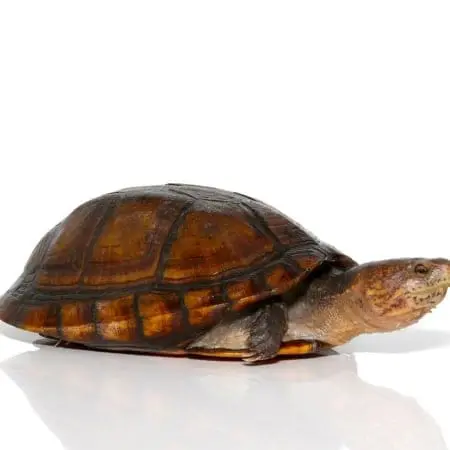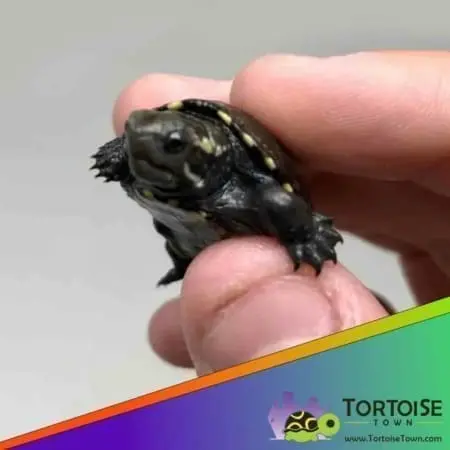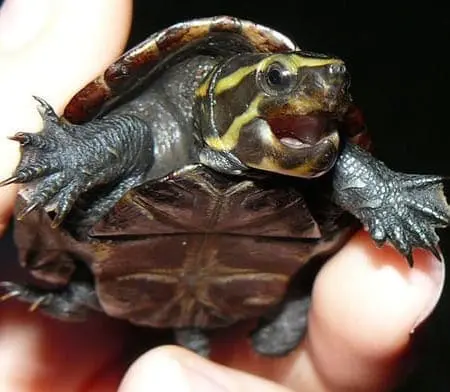Mud Turtle care sheet
 Mud Turtle Housing: a turtle terrarium of at least 90cm in length
Mud Turtle Housing: a turtle terrarium of at least 90cm in length
 Mud Turtle Heating: basking temperature of 100oF and intense UVB
Mud Turtle Heating: basking temperature of 100oF and intense UVB
 Mud Turtle Water Maintenance:temperature of 80oF and a strong filter
Mud Turtle Water Maintenance:temperature of 80oF and a strong filter
 Mud Turtle Diet: carnivorous mix of shrimp, meat and insects
Mud Turtle Diet: carnivorous mix of shrimp, meat and insects
 Mud Turtle Habitat Decoration: basking platform with a ramp
Mud Turtle Habitat Decoration: basking platform with a ramp
Habitat – Before purchasing your new baby mud turtle for sale, or any turtle for sale, specifically aquatic turtles for sale, be sure to learn about setting up the proper mud turtle habitat for our guide below which is general applies to more than just 3 striped mud turtles for sale.
Mud turtles require a turtle tank as their enclosure. This is because they will need fully submerged sections without risk of warping or leaking. The mud turtle can grow to 10-12” long and needs a proportional amount of space to live happily. For this reason we suggest a tank with at least 15″ width.
The tank should also be tall enough to provide areas for the turtle to swim so we suggest a minimum height of around 300mm. A ramp and dock should be used to ensure the turtle has a space to get out of the water and bask.
As juveniles the mud turtle can be kept in a 10″enclosure but this will have to be upgraded as they grow. There are no detrimental effects for having them in the enclosure for life straight away so we usually suggest you start with the full set up.
Mud Turtle Heating:
During the day the peninsular turtle will periodically move on to the basking area. This Allows the turtle to dry off, warm up, absorb UVB and rest. A good basking spot should be around 80oF and provide sufficient UV. All Turtles require additional UVB lighting. Mud turtles require UVB light in order to synthesise vitamin D. Without vitamin D (in particular D3) mud turtles are not able to metabolise calcium properly causing problems with bone growth.
A spot light and UV tube can be used over the basking area of the turtle. Either a 60w or 100w basking bulb should be sufficient depending on temperatures achieved. A 12% intense UV tube (either T5 or T8) can be used to provide the intense UV. Alternatively a single mercury vapor bulb (MVB) can be used to provide both heat and UV. This bulb should be placed 30cm or closer and will need a porcelain or ceramic lamp holder.
Mud Turtle Diet & Feeding:
The mississippi mud turtle will eat a range of aquatic foods, meat products and live foods. Adult as well as Baby 3 striped Mud turtles can also be fed dried foods when the fresh or live options are not available. The dried food should be created with shrimp or meat protein rather than vegetation.
We’ve found that crickets are the most readily accepted, but you can also use dubia cockroaches or locusts, shrimp, salmon.
Mud Turtle Habitat Decorations:
The most important decoration in a mud turtle enclosure is the basking area. It should be large enough to fit the turtle with some room to turn. The basking area should always be in line with the water level to ensure that your turtle can get out easily, there are floating docks available that will reposition to match the water level. A good basking area will also include a ramp for the turtle to make it easier to climb.
Artificial plants are a great way to provide cover under water and add color to the enclosure. Those with weighted bottoms can be fully submerged whilst light plastic decorations can be left to float on top. Giving the turtles partial cover and a mixture of weighted and floating decorations provide great enrichment and help the turtle feel secure.
Large pebbles, coated gravel or riverbed sand can be used to line the bottom of the enclosure. It is advisable to clean any substrate before placing it into the enclosure. The substrate should be left to settle before the equipment is turned back on and the turtles are put in.



